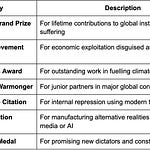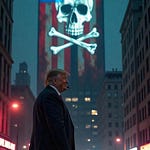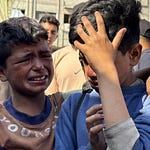This article delves into the complex motivations and multifaceted strategies employed by Trump, carried into his second term, in his systematic efforts to dismantle the International Criminal Court (ICC). Rooted in three interconnected premises – a profound admiration for authoritarian figures and individuals facing international warrants, a palpable personal fear of future ICC indictment and an acute awareness of post-presidency vulnerability. This analysis contends that such a leader’s actions are not merely ideological but represent a sophisticated campaign of self-preservation. The discussion will explore how Trump’s domestic rhetoric and foreign policy decisions, including direct support for individuals targeted by ICC warrants and overt interference in international legal processes, serve to erode the ICC's legitimacy and operational capacity, thereby safeguarding his own precarious future outside of office.
The Erosion of International Legal Order
Imagine a world where the bedrock principles of international justice are systematically undermined by a powerful nation state. This is not a distant dystopia but an existing scenario when key global actors prioritise perceived national interest or individual impunity over collective accountability. Trump, a thin skinned, ego driven fascist with an inability to show compassion or empathy, elected on a wave of nationalist sentiment and a promise to "Make America Great Again” (sic) above all else, champions a unilateralist foreign policy and expresses open disdain for multilateral institutions. His political trajectory shows a consistent pattern of challenging established norms and institutions, both domestically and internationally.
The International Criminal Court stands as a cornerstone of international criminal justice, designed to prosecute individuals for the most heinous crimes: genocide, crimes against humanity, war crimes and the crime of aggression. It plays an aspirational role in ensuring accountability where national courts fail. However, this article will argue that Trump’s relentless campaign against the ICC is fundamentally a self-serving strategy, driven by a deeply ingrained admiration for unaccountable power and an escalating personal fear of future prosecution. His actions are a calculated attempt to dismantle a system he perceives as an existential threat to his post-presidential freedom and influence. This discussion will proceed by examining three core premises that underpin the president's anti-ICC agenda. First I will explore his ideological alignment with authoritarian regimes. Second, the article will analyse the president’s tangible fear of personal indictment by the ICC for his own complicity in international crimes. Finally, I will consider the critical vulnerability he perceives upon leaving office and how this shapes his immediate actions against the court. I will then synthesise these motivations to illustrate the multifaceted strategies employed to undermine the ICC.
Trump's Affinity for Unchecked Power ~ A New World Order?
This section unpacks the president's peculiar admiration for dictators and those facing ICC arrest warrants. It's not simply a casual endorsement; it represents a profound ideological alignment. The president sees these figures as successful examples of leaders who operate beyond the traditional constraints of internal opposition, legal accountability or international condemnation. For him, their ability to act with impunity is not a moral failing but a testament to effective leadership and sheer power. This reveals much about the president's own political philosophy: is it a yearning for absolute control, a rejection of democratic checks and balances or perhaps a belief that "might makes right"? Such admiration translates into his foreign policy; he might publicly praise leaders who suppress dissent, dismiss reports of human rights abuses by favoured regimes as "internal matters" or engage in diplomatic gestures, trade deals or military cooperation that bolster the standing of these controversial figures on the world stage.
His admiration for such figures is fundamentally antithetical to the principles of the liberal international order, which the ICC embodies. The ICC represents universal norms of justice, human rights and accountability. The president's stance suggests a desire to redraw the map of global governance, favouring a multipolar world where sovereignty is absolute and international law is subservient to national interest or individual power. This ideological clash manifests through rhetorical battles, diplomatic offensives and strategic realignment of alliances. Arguably, the president's alliance with these figures serves a strategic purpose beyond mere admiration. By creating a de facto "club" of nations and leaders resistant to international accountability, he seeks to normalise such behaviour and dilute the moral authority of institutions like the ICC. Every act of defiance by an allied dictator against the ICC strengthens the president's narrative that the court is illegitimate or toothless. One might ask, is this a conscious strategy to weaken the system for future personal benefit, or a genuine belief in a different global order that conveniently aligns with his personal aspirations? This question lies at the heart of Trump's motivations.
The Shadow of Indictment ~ Trump's Deep-Seated Fear
Perhaps the most potent driver of the president's anti-ICC campaign is his personal, palpable fear of future indictment. This fear is not abstract; it's deeply rooted in his own actions and policies while in office. He understands that the very mechanisms he is trying to dismantle could one day be used against him, and this fear likely evolves from an anxiety into a consuming paranoia as his involvement in problematic activities deepens.
The weight of his complicity stems from several specific actions that could attract ICC scrutiny. This includes the supply of arms and logistical support, going beyond simple arms deals to encompass scenarios where weapons are knowingly provided to groups or regimes engaged in systematic atrocities - the Gaza Humanitarian Foundation, for example. It also involves providing crucial logistical support such as intelligence sharing, satellite imagery or secure communications channels that directly facilitate war crimes or crimes against humanity. One must consider how international law defines "complicity" or "aiding and abetting" in these contexts; Trump is deliberately blurring lines of responsibility.
There is the crucial element of personnel support. Does Trump deploy military advisors, private military contractors or even regular forces whose actions directly contribute to or are complicit in war crimes? This involves scenarios where his government provides training to forces known for human rights abuses or offers sanctuary to individuals involved in such acts. Putin and Netanyahu spring immediately to mind. The legal ramifications of "command responsibility" are particularly relevant here, even if Trump is not physically present at the scene of the crimes.
Financial support also plays a significant role, referring to funds specifically channelled to regimes or non-state actors known to commit or capable of committing international crimes. This could involve funding for oppressive security apparatuses or financing proxy conflicts where human rights are routinely violated. It raises the complex question of how difficult it is to trace such financial flows and prove criminal intent or knowledge, adding a layer of complexity to the ICC's potential case.
Beyond complicity, the article must discuss how the president's direct orders, policy decisions or strategic directives as head of state could themselves constitute elements of war crimes or crimes against humanity. This might involve authorising specific military operations that violate international humanitarian law, approving the targeting of civilian infrastructure or implementing policies that lead to widespread suffering or forced displacement. The recent withdrawal, and subsequent reinstatement, of military support to Ukraine is an extreme example of punishing a supposed ally because they refused to bend the knee to the paper thin ego of Trump and his bully assassin Vance. This shifts the narrative from indirect support to direct culpability. How does Trump attempt to deflect or justify these actions domestically? Does he frame them as "necessary evils" or "national security imperatives"? Trump’s fear is not irrational; it is based on a realistic assessment of potential legal exposure under specific provisions of the Rome Statute, such as Article 25 on individual criminal responsibility or Article 28 on command responsibility.
The Peril of Post-Presidency ~ The "Travel Curtain"
A practical manifestation of Trump's fear is the impending loss of sovereign immunity upon leaving office. The shield that protects sitting leaders from prosecution in foreign courts or by international bodies like the ICC simply dissipates. He becomes a private citizen, albeit a high-profile one, subject to the very laws he sought to undermine. One must consider how aware Trump is of this impending vulnerability, is it a gradual realisation or a sudden epiphany as his term draws to a close?
The prospect of an ICC arrest warrant would severely curtail his ability to travel internationally, creating a metaphorical "travel curtain". Many countries, particularly those signatories to the Rome Statute, would be obligated to cooperate with an ICC request for arrest and surrender. How would this impact a person accustomed to global influence, power and the trappings of statesmanship? It would condemn him to a life confined to non-signatory nations or countries sympathetic to his cause, a profound personal blow for a figure who likely thrives on international recognition.
The president's support for Vladimir Putin, particularly after the ICC issued an arrest warrant for him, serves as a crucial example of his self-preservation strategy in action. This is not simply a matter of geopolitical alignment; it is a direct test of the ICC's power and an attempt to set a precedent of impunity. His government actively works to shield Putin by publicly denouncing the warrant as politically motivated or illegitimate, refusing to cooperate with any ICC investigative requests related to Putin, lobbying allied nations to ignore or denounce the warrant, and perhaps even offering covert assistance to Putin's travel or financial arrangements to circumvent potential arrest. By successfully protecting Putin, Trump hopes to demonstrate that the ICC's reach is limited and that powerful individuals can indeed evade justice. This is, in essence, a dress rehearsal for his own potential future.
Furthermore, Trump's public call for the corruption trial against Benjamin Netanyahu to be dropped, labelling it a "witch-hunt" serves as another potent illustration of his underlying anxiety. While this is a domestic legal matter, Trump's intervention reveals much about his broader philosophy towards judicial independence and accountability. His rhetoric aims to delegitimise legal processes, suggesting that powerful political figures should be immune from prosecution for any crime. This normalises the idea that charges against him too might be a "witch-hunt". This behaviour shows a deep-seated contempt for the rule of law itself, seeing it not as a fair and impartial arbiter but as a political tool that can be manipulated or dismissed when inconvenient. This ethos directly contradicts the very foundation of the ICC.
Trump's Anti-ICC Playbook ~ Strategies of Undermining
Trump employs a multifaceted playbook to undermine the ICC. His strategies include relentless rhetorical assaults and delegitimisation, where he consistently portrays the ICC as biased, incompetent or a tool of foreign influence, using strong, emotionally charged language. He often frames the ICC as an infringement on national sovereignty and a violation of non-interference principles, harnessing populist discontent against international bodies by portraying them as elitist or out of touch, thereby turning domestic public opinion against the court.
He also employs significant diplomatic and political pressure. If his country is a State Party, he might threaten to withdraw from the Rome Statute; if not, he openly encourages others to do so. He imposes sanctions on ICC officials, judges or prosecutors, restricting their travel or financial access. As a permanent member of the UN Security Council, he consistently blocks any resolutions that would refer situations to the ICC or enforce its mandates. Furthermore, he exerts bilateral coercion, pressuring allied nations to cease cooperation with the ICC or to reject its jurisdiction.
Beyond rhetoric and diplomacy, there is active disruption of investigations and operations. This involves a steadfast refusal to provide evidence, intelligence or access to witnesses. He actively makes it difficult for potential witnesses to provide testimony or ensure their safety, and even offers asylum or protection to individuals with ICC arrest warrants. His administration also funds and supports media campaigns that spread false information about ICC investigations or the court's activities.
Finally, Trump actively works to promote alternative or competing frameworks. He advocates for national legal systems to handle all cases, even when they are clearly unwilling or unable to do so effectively, pushing a "national justice first" agenda. He prioritises bilateral agreements and negotiations over multilateral legal frameworks, thus weakening the collective international legal order. In a more audacious move, he might even float the idea of establishing a new "impartial" international court that is, in reality, designed to be toothless and easily controlled.
A Precarious Future for International Justice
To reiterate, Trump’s crusade against the ICC is not merely ideological but a deeply personal and calculated strategy for self-preservation. His admiration for despots, his fear of indictment and his post-presidency vulnerability form an unbreakable causal chain driving his actions. Each premise contributes to the overall narrative of a leader dismantling a system he views as an existential threat, making his actions against the ICC a form of pre-emptive self-defence.
This carries profound real-world implications for international law. It highlights the alarming fragility of international institutions, demonstrating how easily a powerful state actor can undermine and potentially dismantle bodies built over decades. It underscores the dangers of unchecked executive power, particularly when national leaders prioritise personal impunity over universal norms of justice. This path leads to the erosion of accountability, setting a terrifying precedent for future leaders and the victims of international crimes. What message does it send if the powerful can simply dismantle the mechanisms designed to hold them to account?
This narrative reminds us of the perennial tension between national sovereignty and the imperative of international justice. Trump’s actions serve as a stark reminder of the continuous effort required to uphold and strengthen the global architecture of accountability and prevent a return to a world where impunity reigns supreme.













Share this post